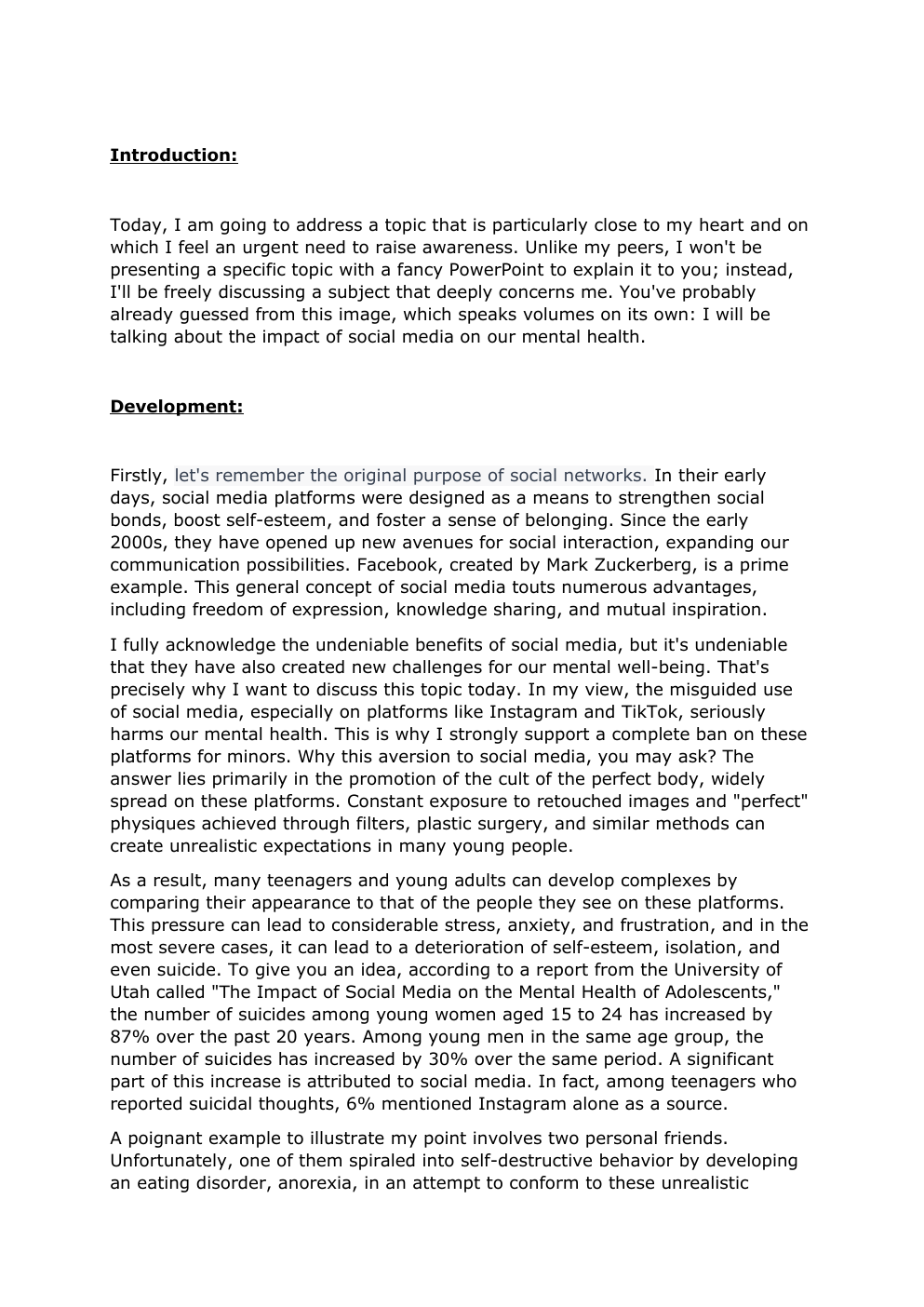Exposé medias et santé mentale chez les jeunes
Publié le 28/03/2024
Extrait du document
«
Introduction:
Today, I am going to address a topic that is particularly close to my heart and on
which I feel an urgent need to raise awareness.
Unlike my peers, I won't be
presenting a specific topic with a fancy PowerPoint to explain it to you; instead,
I'll be freely discussing a subject that deeply concerns me.
You've probably
already guessed from this image, which speaks volumes on its own: I will be
talking about the impact of social media on our mental health.
Development:
Firstly, let's remember the original purpose of social networks.
In their early
days, social media platforms were designed as a means to strengthen social
bonds, boost self-esteem, and foster a sense of belonging.
Since the early
2000s, they have opened up new avenues for social interaction, expanding our
communication possibilities.
Facebook, created by Mark Zuckerberg, is a prime
example.
This general concept of social media touts numerous advantages,
including freedom of expression, knowledge sharing, and mutual inspiration.
I fully acknowledge the undeniable benefits of social media, but it's undeniable
that they have also created new challenges for our mental well-being.
That's
precisely why I want to discuss this topic today.
In my view, the misguided use
of social media, especially on platforms like Instagram and TikTok, seriously
harms our mental health.
This is why I strongly support a complete ban on these
platforms for minors.
Why this aversion to social media, you may ask? The
answer lies primarily in the promotion of the cult of the perfect body, widely
spread on these platforms.
Constant exposure to retouched images and "perfect"
physiques achieved through filters, plastic surgery, and similar methods can
create unrealistic expectations in many young people.
As a result, many teenagers and young adults can develop complexes by
comparing their appearance to that of the people they see on these platforms.
This pressure can lead to considerable stress, anxiety, and frustration, and in the
most severe cases, it can lead to a deterioration of self-esteem, isolation, and
even suicide.
To give you an idea, according to a report from the University of
Utah called "The Impact of Social Media on the Mental Health of Adolescents,"
the number of suicides among young women aged 15 to 24 has increased by
87% over the past 20 years.
Among young men in the same age group, the
number of suicides has increased by 30% over the same period.
A significant
part of this increase is attributed to social media.
In fact, among teenagers who
reported suicidal thoughts, 6% mentioned Instagram alone as a source.
A poignant example to illustrate my point involves two personal friends.
Unfortunately, one of them spiraled into self-destructive behavior by developing
an eating....
»
↓↓↓ APERÇU DU DOCUMENT ↓↓↓
Liens utiles
- La santé mentale en ligne Breugelmans Chrystèle PSYL1 15610052
- Quiconque ne partageait pas son goût pour les bolides italiens, les couturiers parisiens, les condos de prestige et les tout jeunes hommes un rien canailles lui paraissait souffrir d'une grave anomalie mentale. André Truand, Une douzaine de beignes pour le sergent
- Abus Sexuel Et Santé Mentale
- exposé anglais introduction to the Consumer Society
- exposé ivg emc




